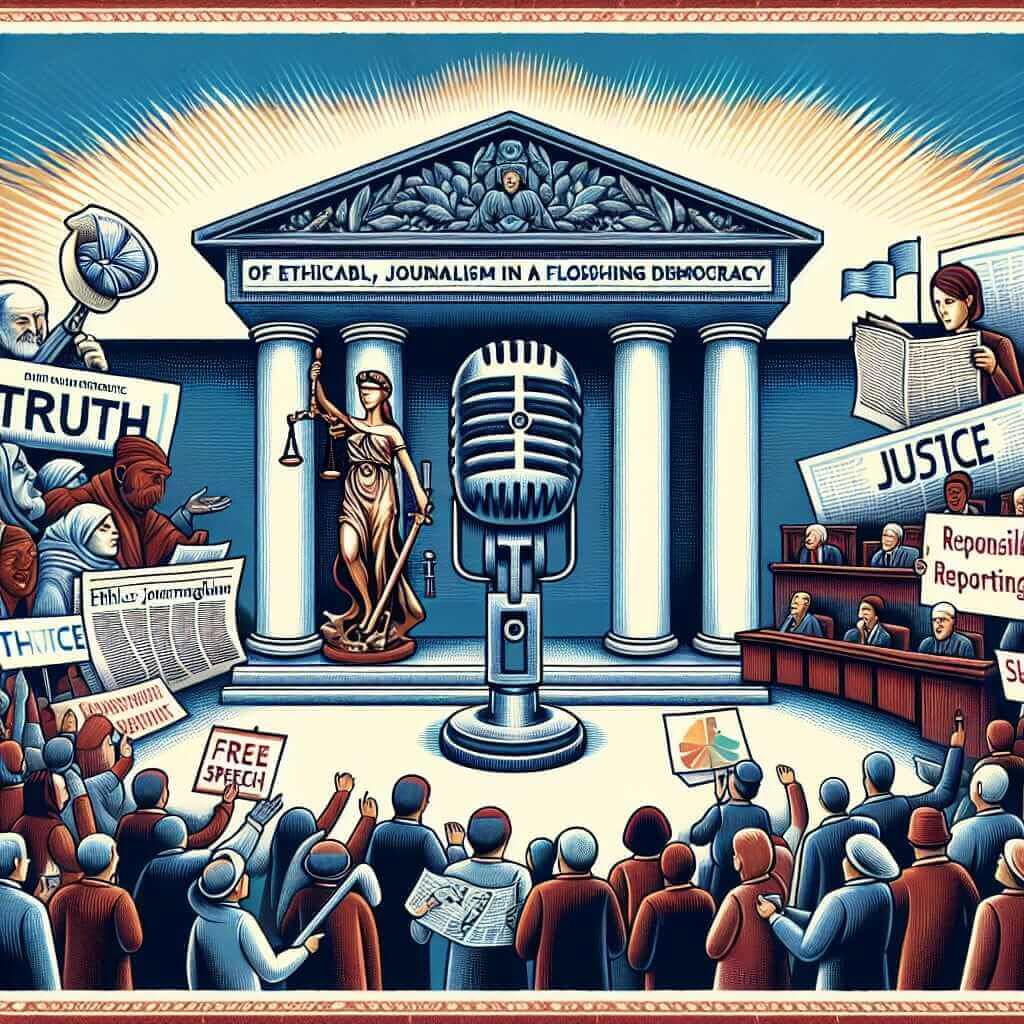In an increasingly interconnected world saturated with information, the role of ethical journalism in upholding democratic values has never been more critical. This topic often surfaces in the IELTS Writing Task 2, requiring test-takers to demonstrate their understanding of this crucial relationship.
Understanding the Topic and Crafting Your Essay
Potential IELTS Essay Questions
Here are some potential IELTS Writing Task 2 questions related to “The importance of ethical journalism in a democracy”:
- Some people believe that the news media has a significant influence on people’s lives. Others disagree, arguing that people are not so easily swayed by the media. Discuss both views and give your opinion.
- In the digital age, access to information is easier than ever before. However, this has led to concerns about the spread of misinformation. What are the challenges and responsibilities of journalists in this context?
- A free and independent press is essential for a healthy democracy. To what extent do you agree or disagree?
Sample Essay Question Analysis:
Let’s analyze this question: “A free and independent press is essential for a healthy democracy. To what extent do you agree or disagree?”
This question requires you to present a clear stance on the importance of a free and independent press for a functioning democracy. You need to provide compelling arguments to support your position and illustrate your points with relevant examples.
Sample Essay:
A free and independent press is often regarded as the cornerstone of a healthy democracy. This essay will argue that such a press is not merely important but absolutely essential for a thriving democratic society.
Firstly, a free and independent press acts as a vital watchdog, holding those in power accountable for their actions. Journalists play a crucial role in investigating and reporting on government activities, exposing corruption, and ensuring transparency. By providing citizens with unbiased information, the press empowers them to make informed decisions and hold their elected officials responsible. For instance, investigative journalism played a key role in uncovering the Watergate scandal in the United States, ultimately leading to the resignation of President Richard Nixon.
Secondly, a free press facilitates a diversity of opinions and fosters public discourse, which are essential for a healthy democracy. By providing a platform for different voices and perspectives, the media encourages debate and critical thinking. This allows citizens to engage in meaningful conversations about important issues and contribute to informed decision-making. Conversely, when the press is controlled or censored, it creates an environment where propaganda and misinformation can thrive, undermining the very foundations of a democratic society.
However, it is important to acknowledge that press freedom does not equate to absolute freedom. Journalists have a responsibility to report truthfully and ethically, avoiding the spread of misinformation or the incitement of violence. Striking a balance between freedom and responsibility is crucial to ensure that the press serves its vital role in a democracy.
In conclusion, a free and independent press is not just an element of a healthy democracy; it is the very lifeblood that sustains it. By holding power to account, fostering open dialogue, and providing citizens with the information they need to participate in their governance, a free press is an indispensable pillar of a thriving democratic society.
(Word count: 285 words)

Writing Tips for an Effective Essay
- Structure: Follow a clear structure: Introduction, Body Paragraph 1 (Argument 1), Body Paragraph 2 (Argument 2), (Optional – Counter-Argument Paragraph), Conclusion.
- Clarity and Conciseness: Use clear and concise language to convey your ideas effectively. Avoid using overly complex sentence structures or vocabulary.
- Vocabulary: Utilize a range of vocabulary related to journalism, democracy, and ethics. Some examples include: “investigative journalism,” “freedom of the press,” “accountability,” “transparency,” “public discourse,” and “misinformation.”
- Grammar: Pay close attention to grammar accuracy, especially subject-verb agreement, verb tenses, and articles.
- Examples: Provide relevant and specific examples to support your arguments. These examples can be drawn from current events, historical events, or even hypothetical situations.
- Cohesion and Coherence: Use transition words and phrases to link your ideas smoothly and create a logical flow throughout your essay.
Vocabulary Builder:
Here are some helpful vocabulary words and phrases related to this topic:
- Ethical Journalism (n.) /ˈeθɪkəl ˈdʒɜːrnəlɪzəm/: Journalism that adheres to a strict code of ethics, emphasizing truth, accuracy, fairness, and objectivity.
- Democracy (n.) /dɪˈmɒkrəsi/: A system of government in which power is vested in the people and exercised by them directly or through freely elected representatives.
- Free Press (n.) /friː prɛs/: Media that is independent of government control and censorship, free to report on any issue without fear of reprisal.
- Accountability (n.) /əˌkaʊntəˈbɪləti/: The obligation of those in power to be held responsible for their actions and decisions.
- Transparency (n.) /trænsˈpærənsi/: The quality of being open and honest in all dealings, especially in government and business.
- Misinformation (n.) /ˌmɪsɪnfəˈmeɪʃən/: False or inaccurate information that is spread, regardless of intent to deceive.
- Propaganda (n.) /ˌprɒpəˈɡændə/: Biased or misleading information used to promote a particular political cause or point of view.
- Censorship (n.) /ˈsɛnsəʃɪp/: The suppression of speech, public communication, or other information that may be considered objectionable, harmful, sensitive, or inconvenient to others.
- Watchdog (n.) /ˈwɒtʃdɒɡ/: A person or organization that monitors the activities of another entity to ensure that they are acting legally and ethically.
- Public Discourse (n.) /ˈpʌblɪk ˈdɪskɔːs/: Communication about matters of public interest, often involving debate and the exchange of different viewpoints.
Conclusion
Discussing the importance of ethical journalism in a democracy is a complex yet crucial topic. By understanding the key concepts, structuring your essay clearly, and using relevant vocabulary, you can effectively convey your ideas and achieve a high band score in the IELTS Writing Task 2. Remember to practice writing essays on similar topics to build your confidence and refine your skills. You can find more information on ethical journalism and related topics on websites like IELTS.net.